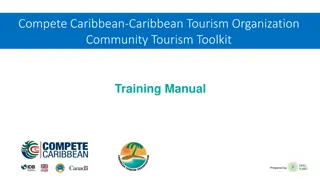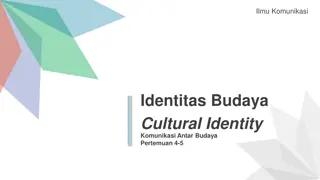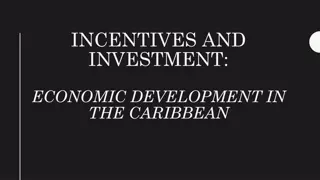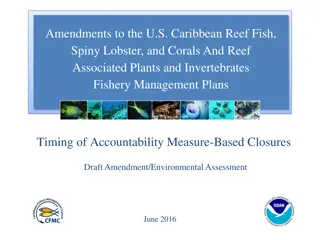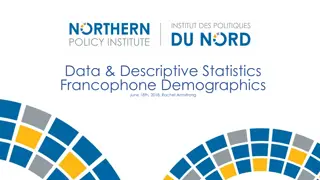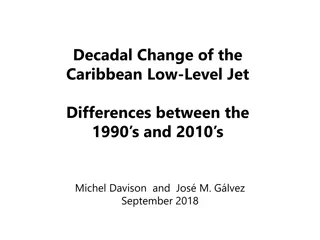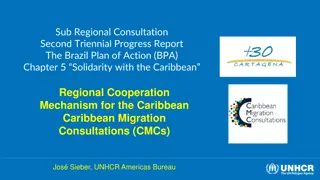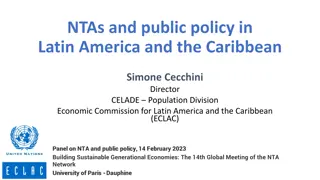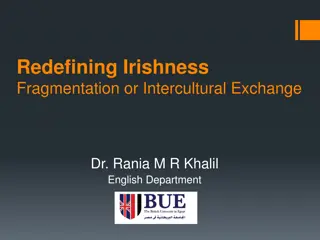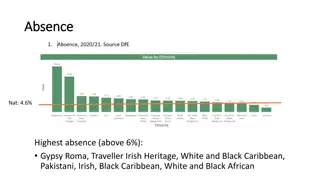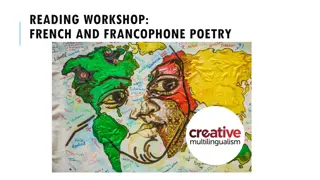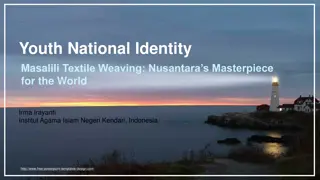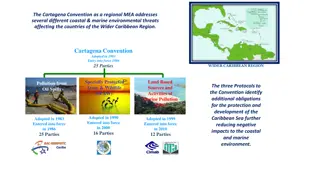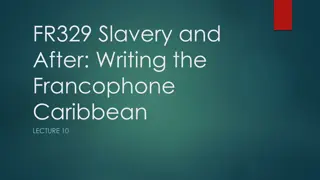Creolit and Cultural Identity in the Francophone Caribbean
Exploring the concept of Creolit in the Francophone Caribbean through the works of Maryse Cond, this lecture delves into the unique perspective that emphasizes the use of Creole language as a foundation for literature. It discusses the tensions between authenticity and exclusion, as well as the themes and narratives prescribed by the Créolité school. The novel "Traverse de la mangrove" is analyzed as a reflection of diverse yet segregated community dynamics, challenging ethnic prejudices and envisioning a different future. The metaphor of the mangrove forest is used to symbolize fluidity, influence, and entanglement in cultural identities. The ambiguity in the title "Victoire, les saveurs et le mots" points to themes of assimilation, race, and artistic expression in the context of Caribbean history.
Download Presentation

Please find below an Image/Link to download the presentation.
The content on the website is provided AS IS for your information and personal use only. It may not be sold, licensed, or shared on other websites without obtaining consent from the author.If you encounter any issues during the download, it is possible that the publisher has removed the file from their server.
You are allowed to download the files provided on this website for personal or commercial use, subject to the condition that they are used lawfully. All files are the property of their respective owners.
The content on the website is provided AS IS for your information and personal use only. It may not be sold, licensed, or shared on other websites without obtaining consent from the author.
E N D
Presentation Transcript
FR329 Slavery and After: Writing the Francophone Caribbean LECTURE 8
Maryse Cond and Crolit The Martinican school of Cr olit is singular because it presumes to impose law and order. Cr olit is alone in reducing the overall expression of creolness to the use of the Creole language. Eloge de la cr olit dictates that literature must be founded on the acquisition of the creole language in its grammar, its basilectal lexicon, its orthography, its intonation, its rhythm, is soul its poetics . This implies a notion of authenticity, which inevitably engenders exclusion, as authenticity is based on the very normative ideology that for so long consigned us to the world s periphery. Worse yet, the Cr olit school is terrorizing in its detailed catalogue of acceptable literary themes. Were the stakes less high, we might smile at the attempt to dictate to the imagination of the writers the quasi-folkloric subjects worthy of inspiration: djobeur, dorlis, zombis, chouval- twapat, soukliyan, majo, ladja, koudmen, as if creativity were an inventory summoned at will. Maryse Cond , Cr olit without the Creole Language , in Caribbean Creolization: Reflections on the Cultural Dynamics of Language, Literature, and Identity, ed. By Kathleen M. Balutansky and Marie-Agn s Sourieau (UP of Florida, 1998), pp. 101-109 (106-107).
Traverse de la mangrove (1986) - Guadeloupean community : B k s, descendants of slaves, white metropolitans, Haitians, Mulattoes, and Koulis; polyphonic narration ; diverse but segregated community Vs. Sancher/Sanchez = enigma vehicle to reassess ethnic prejudices, creolness, and envision a different future; Sancher/Sanchez: Travers e de la mangrove (=rhizome):
Mangrove The mangrove forest is a mesh of both land and water, and in that sense it is fluid, borderless, open to influence and change? and might it not be called a metissage! Yet because of its rhizomatic lateral growth patterns, which prominently feature prop roots and pneumatophores, it can also contain, entangle, strangle, bind, thus acting much like a border. Ruthmarie H. Mitsch, Maryse Cond 's Mangroves , Research in African Literatures, Vol. 28, No. 4, Multiculturalism (Winter, 1997), pp. 54-70 (55).
Victoire, les saveurs et le mots Ambiguity of the title : Victoire : victorious ? Saveur/savoir ? Mots/maux ? History of Caribbean assimilation and the emergence of a Black middle-class Victoire = white: class vs. race? Third Republic: n graille (see C saire) vs. Grands Noirs autobiographical dimension no teleology of progress low vs. high culture Victoire = artist // Cond Victoire s misery vs. parents progress :
Emancipation, assimilation and conformism vs. Victoire s Creole sensuality and inventiveness [ ] l entr e de Jeanne et Auguste dans le cercle des Grands N gres. Ils devinrent un des couples les plus en vue de La Pointe. [ ]. J avoue que je ne comprends gu re les raisons de cette pr minence. Car je ne les vois exceller dans aucun domaine particulier, manifester aucun don sp cifique. Les Grands N gres fond rent une association culturelle, Aliz s , qui publiait une feuille de chou assez pr tentieuse, Trait d union. Je n y vois nulle part la signature de mon p re. Celle de ma m re figure sous deux articles sans grand int r t, assez platement r dig s. L un d fend la n cessit d une ducation d mocratique et la que, son dada ; l autre est l obituary d une de ses coll gues [ ]. A part cela, ils n exprim rent jamais aucune opinion politique, ne prirent part aucun grand combat, pp. 259-260.
Both Victoire, les saveurs et les mots and Elmire des sept bonheurs [by Chamoiseau] return to a neglected period in Antillean history, the si cle oubli or forgotten century between the abolition of slavery in 1848 and the advent of departmentalization in 1946, emphasizing present memory s gaps and silences with respect to this past moment. Cond s text confronts a wilful family silence about her grandmother s life and origins [ ]. N. Simek, Hunger and Irony in the French Caribbean: Literature, Theory, and Public Life (2016), p. 150. Cond s novel: realist but fictional see epigraph see Dernier Argilius (not mentioned by Jean-Pierre Sainton; close to H g sippe Jean L g timus?). Why invention?
Conds guerrilla history In proposing a menu of near certainties, plausible accounts, and clear and ambiguous inventions, Cond offers a story of what might have been, of what probably was, but also of what might have been otherwise. Attempting to confirm the truth or fiction of her references [ ] produces an ironic doubling, a juxtaposition of textual representation against (real or imagined) extra-textual confirmation that leads not to a single truth about what happened, but to a new critical question about the interpretation of existing sources and their gaps: how does it matter that this is what happened, and how might it have happened differently? N. Simek, Hunger and Irony in the French Caribbean: Literature, pp. 162-163.
Ceux qui nont invent ni la poudre ni la boussole Cond and the limit of scholarship and historical research? See colonial scholars: tendency to fabricate facts, falsify reality, and manipulate the truth // past and present epistemological violence see VY Mudimbe s The Invention of Africa (1988) Caribbean also invented by the Western gaze; ceux qui n ont jamais su dompter la vapeur ni l lectricit ceux qui n ont explor ni les mers ni le ciel mais ils savent en ses moindres recoins les pays de souffrance , C saire, Cahier d un retour au pays natal, p. 44 (Editions Pr sence Africaine) However no ambition to recreate an authentic past (Vs Damas) = inventiveness is cathartic/therapeutic




